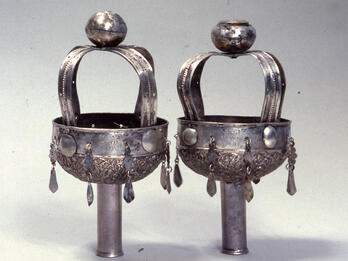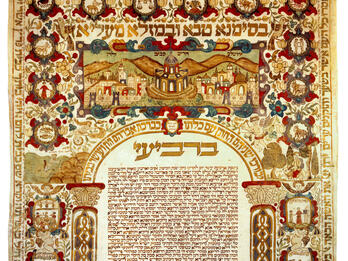Letter from Acre to His Father: First Part
After wishing you good health and well-being and kissing your hand, as is befitting, and also to Madame my mother, blessed among women, amen, and to all the members of the household, may the Rock protect them, amen, may it be His will, I will review for your lordship the order of our voyage and our sojourns accurately and at length. I left the city of Livorno to ascend to the holy city, may it be built up and established speedily in our days, on the New Moon of Av, may it be changed for good, in the year of “may those who hope in you not be ashamed” [1741]. I went to one of the cities of Edom, which is called Messina, and it is the one called Sicilia, as the expulsion of the Spanish Jews happened from there. They spread out over the entire West. Now in the year 5501 they have once again accepted the Jews in their land. This city is under the rule of the king of Naples, and it is all a single kingdom, and silk is produced there, as well as every precious vessel. It took us ten days to get from Livorno to Messina, a distance of five hundred miles. On the evening of the holy Sabbath, the 8th of the month of Av, may it be changed for the good, a wave in the sea rose up against us, and we were nearly lost, and all the ceramic vessels broke from the great shaking as the ship rocked from side to side. Praised be God, halfway through the night the ship rested and was quiet, as the Holy One, blessed be He, sent a good wind to drive it.
At night, after the conclusion of the Sabbath we came to a great mountain [i.e., the volcano on the island of Stromboli]. No ship sails around that mountain, because it spews out great stones every day, and all day smoke and flames of fire rise up from it, especially increasing at night. The fiery flames that rise from it reach up to four cubits or more and then the embers fall into the sea. It does this all night and all day, but in the daytime the fire cannot be seen, just the smoke. Everyone who sees it marvels at the wonder. That column of fire that rises from that mouth inside the mountain ascends to forty ells, and it is so thick that a string of six ells could not encompass it.
On the next day, Sunday, the tenth of the merciful father1 we entered Messina, and the gentiles received us with great love. But we could not enter the city right away, for it is their custom regarding ships that come from the cities of Edom and ships that come from the west [i.e., North Africa], that they must all undergo a quarantine, each according to what is required, not in equal measure. For example, we had to wait only seven days, whereas ships that come from the east and west are held up sixty or seventy days, all in accordance with the city in question and its diseases.
When we arrived in Messina, they sent a little boat to us and brought us into a single house that was situated within another building, and in that inner house were two springs and a vine. Beneath the vine were two priests, who said to us, “What are you? That is, are you gentiles or Jews or Edomites [Christians]? We said to them, “We are Jews.” They said, “Praise the Lord that we have seen Jews in our city.” They then said to us, “How many are you?” We replied, “Thirty men and women and children.” They responded, “If only you were thirty thousand, as then you could dwell in our land and trade with it and live in security upon it. No one would dare open his mouth and make a noise if you wanted to bear arms and you walked about the city like dukes and princes. Everything is before you: build cities and towers, for the land is broad before you, dwell and trade in it, and take possession of it.” They examined our limbs in case—perish the thought and heaven forfend—there might be a sick person or someone afflicted with the plague, God forbid, for it is their custom to strike a person on his arm under the armpit, and on the thigh bone from the inside, but they found nothing. We returned to the ship to observe there the seven-day quarantine.
On the third day, a letter came from the dukes saying that because Jews were on the ship, they would have to wait only three days rather than seven, and anyone who wanted to buy anything from the city was entitled to do so. Immediately, a man came who was responsible for the Jews, whose job was to rescue the oppressed from the oppressor, and he said, “Come brothers, come comrades, enter the city, and if anyone reviles you, pay him back twice over. Do not be afraid, for I have permission from the king, and therefore be strong and brave, and do not fear or be afraid of them.” We then entered the city without delay.
The city is well built, but it is of ancient construction, and it is truly built entirely on the water. Within the city there is no market which does not contain two fountains of water, and every transaction and sale and merchandise of theirs is in silk, because all of them have houses where they make silk clothes and embroidery. We stayed in the city for a full seventeen days, to eat of its fruit and be sated with its benefits, as it is a fine place. There are still houses there which have a mezuzah from the early period, before the Jews were expelled. There are also among them some who hate Jews by nature, but out of fear of the monarchy they cannot talk, and they shrink up sourly. Nevertheless, even when they are among the people of that land they speak well of the Jews, because thus the king has decreed, that everyone should speak well of the Jews, for they are the vitality [see Exodus 1:19] of all the nations.
Many of them said that any place that lacks Jews is regarded as nothing and chaos, and the residents of those countries are considered like the dust of the earth. They further add, “Look at Livorno and Italy and the like, where there are Jews, how much merchandise there is and how much buying and selling.” Blessed be the Lord, who put the favor of this nation in their eyes [see Exodus 12:36]. How great is His bounty and mercy upon us, for if this were not the case, we could not survive, a lamb among the wolves, a sheep among the young lions. The whole city is poor, and one who has a hundred gold pieces is called rich. The city has seven large harbors on the seaside, but so as not to go on too long, I did not want to write any other details.
Notes
[“Av,” the name of the Hebrew month, also means “father.”—Trans.]
Credits
Published in: The Posen Library of Jewish Culture and Civilization, vol. 5.




